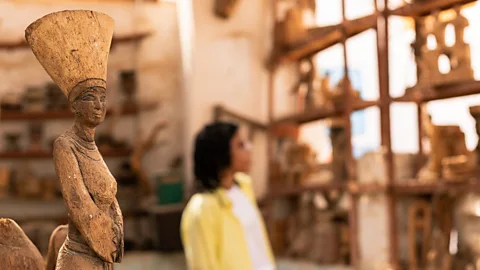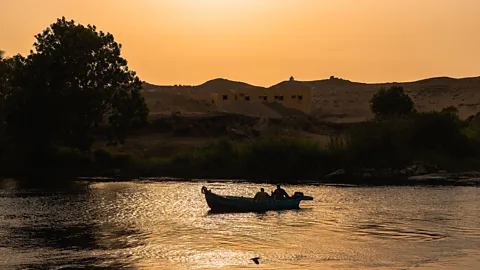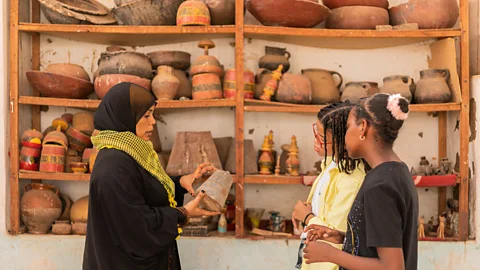The woman reviving Egypt's Nubian heritage
 Mai Farouk
Mai FaroukNubian filmmaker Hafsa Amberkab is reclaiming the power of narrative by connecting younger generations to their language and culture that was lost in their drowned ancestral land.
In the opening lines of a forgotten song called Mshkomsy, 70-year-old Haseeba is transported back to her childhood on the banks of the Nile in southern Egypt. Two hundred kilometres north of her drowned ancestral land, Haseeba's daughter Hafsa has asked her to sing something in Kenzi (also known as Mattokki) – one of two Nubian languages spoken in Egypt along with Fadicca – and from somewhere deep in her memory, Haseeba extracts part of the song she loved when she was young.

50 Reasons to Love the World – 2021
Why do you love the world?
"Because even though I set out to preserve my heritage, which I could see disappearing bit by bit, I keep discovering that there's so much more beauty in Nubia that we still don't know about." – Hafsa Amberkab, filmmaker
"I watch the boat come from afar, sails and flags rippling in the air. Where could I ever find another? I miss Nubia, I miss the mountains of Nubia," the septuagenarian translates the only lines she re from an unrecorded song by Nubian artist Abdo El Saghirfor her daughter, filmmaker and organiser Hafsa Amberkab, whose chosen surname honours her family's ancestral home: the village of Amberkab. In 2019, Amberkab was making her first documentary exploring her Nubian heritage. Though she thought herself fluent in Kenzi, she didn't know her native tongue had a word for 'I miss': mshkomsy.
When Haseeba was a young girl in the 1950s, Amberkab was still a few years away from being flooded by the construction of the Aswan High Dam in 1964, which resulted in tens of thousands of people displaced, and 44 Nubian villages submerged behind the mammoth megaproject.
Indigenous to southern Egypt and northern Sudan, Nubians of the eastern Sahara have been closely connected to Egypt for millennia. The Twenty-Fifth Dynasty, for instance, consisted of Nubian pharaohs from the Kingdom of Kush who ruled Ancient Egypt in the 7th Century BCE. Though the foundation of modern Egypt included the area known as Lower Nubia, the ethno-linguistic group, which now mainly lives north of Lake Nasser (called Lake Nubia south of the Sudanese border), is historically and culturally distinct from other communities in Egypt.
For thousands of years, the connection to the Nile was central to Nubian civilisation and culture – though rituals, ceremonies, music and economy – until 1964, when most villages, including Amberkab, were resettled into the government project Nasr El-Nuba, in the land-bound desert near Kom Ombo, 70km northeast of the High Dam. The initial relocation also led to thousands leaving for big cities like Cairo, Alexandria and Suez in search of opportunities. Others immigrated out of the country, creating diaspora communities in the Gulf countries, North America, Europe and Australia. Known colloquially as "Nubian", both Kenzi/Mattokki and Fadicca, which is also spoken in northern Sudan, have fallen into relative disuse as people dispersed and intermingled with non-Nubian communities.
 Mai Farouk
Mai FaroukIn Nasr El-Nuba, stories of ancestral lands like Haseeba's are cherished by an aging generation, who hold a tighter grasp on the language, despite being completely disconnected from the Nile. Conversely, those closer to the city of Aswan, 50km to the south, who still live by the river and work in tourism have kept some Nubian customs alive by marketing them as touristic experiences. (The Nile crocodile, a culturally significant symbol of strength, can be seen in shallow pits in many Nubian guesthouses.)
The word "mshkomsy", and Amberkab's ignorance of it, is emblematic of the state of Nubian languages today: even those that do speak them often have glaring gaps in their knowledge.
"The more songs my mother sang, the more we explored, and the more we realised I didn't know," Amberkab recalled. Camera in hand, the young filmmaker set out on an odyssey to find all she didn't know about her home and heritage and share it with the next generation of Nubian youth through Koma Waidi, an Aswan-based education initiative focused on workshops and heritage documentation, which means "tales of the past" in Kenzi.
I met Amberkab on the sun-baked roof of a guesthouse on Elephantine Island, a two-minute boat ride across from Aswan. We took respite from the heat, watched the boats over the shimmering river, and contemplated the fear and wonder of crocodile taxidermy – strewn about the owner's collection of antiques lay 3m-long stuffed and mounted crocodiles. Above them, display shelves held delicate wooden carvings of traditional Nubian houses, a cabinet housed vintage 16mm cameras and British pocket-watches, and a wall was piled high with traditional clay pots, old wooden containers and a few mass-produced souvenirs.
Amberkab was deep in conversation with 13-year-old Koma Waidi participants Samaa Merghany and Doha Tarek, who had ed us to talk about their experience learning to make documentaries about their heritage. Picking up item after item from the guesthouse's shelves behind her, Amberkab taught the teenagers about the old barter economy, marriage rituals and how to make traditional kohl, the eyeliner prevalent in cultures across the Middle East, South Asia and parts of Africa.
 Mai Farouk
Mai FaroukThe whole conversation took place in Arabic, not Kenzi, which none of the girls – Samaa, Doha or 18-year-old Koma Waidi volunteer Shahd El-Rawy – speak. "Here on the island, because we're so close to the city, we're very assimilated," explained El-Rawy. "Our parents and grandparents speak the language, but the new generation usually only understands it."
This language gap is due to displacement, cultural marginalisation and, according to Amberkab and the three students, a perceived correlation between assimilation and career success. Amberkab also explained that parents don't want their children to be made fun of at school for being different, especially if they already have Nubian features, which tend to include a darker complexion than the average Egyptian, already marking them as "other" in a prevalent anti-black society.
As the only Nubian family in an Arabic-speaking neighbourhood and school, Merghany's father didn't want her to be outcast, but now the teenager is resolved to embrace her identity.
"It's who I am, how could I not know something like that">window._taboola = window._taboola || []; _taboola.push({ mode: 'alternating-thumbnails-a', container: 'taboola-below-article', placement: 'Below Article', target_type: 'mix' });
